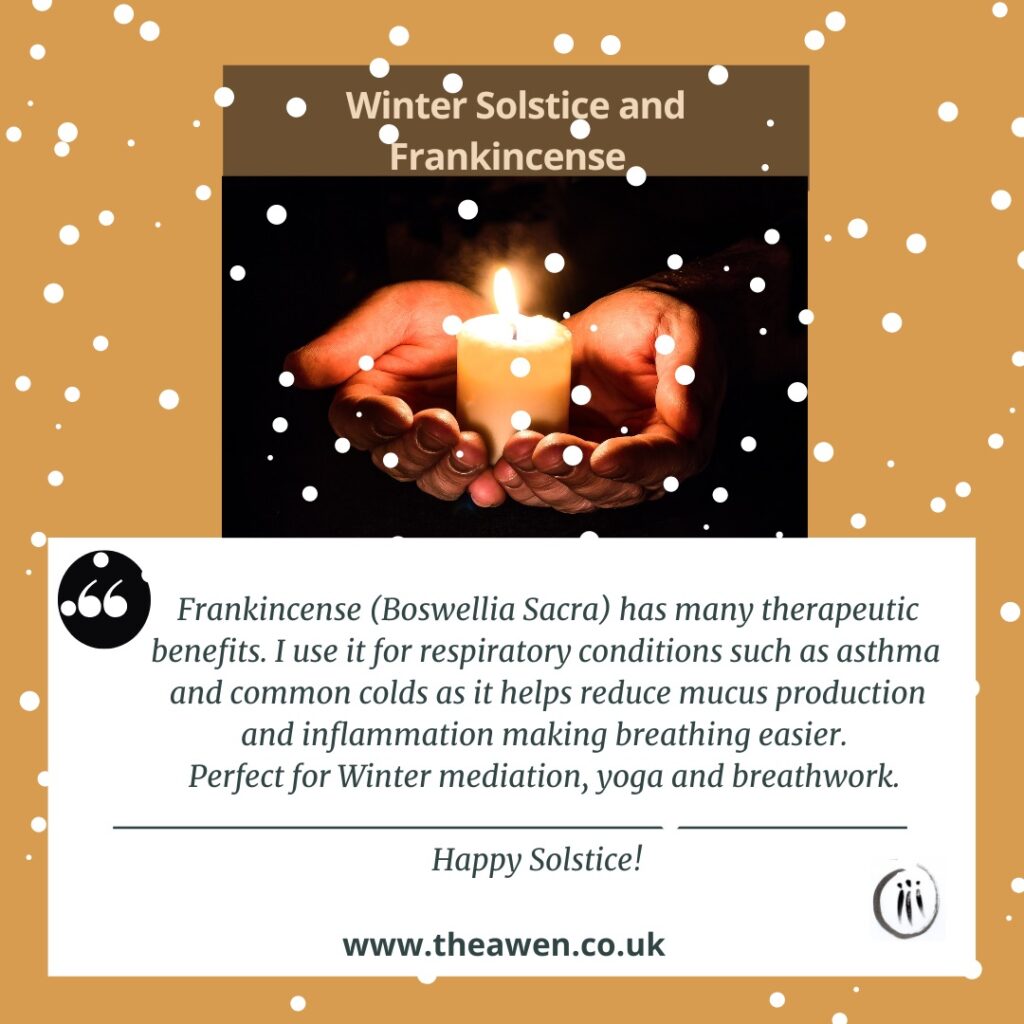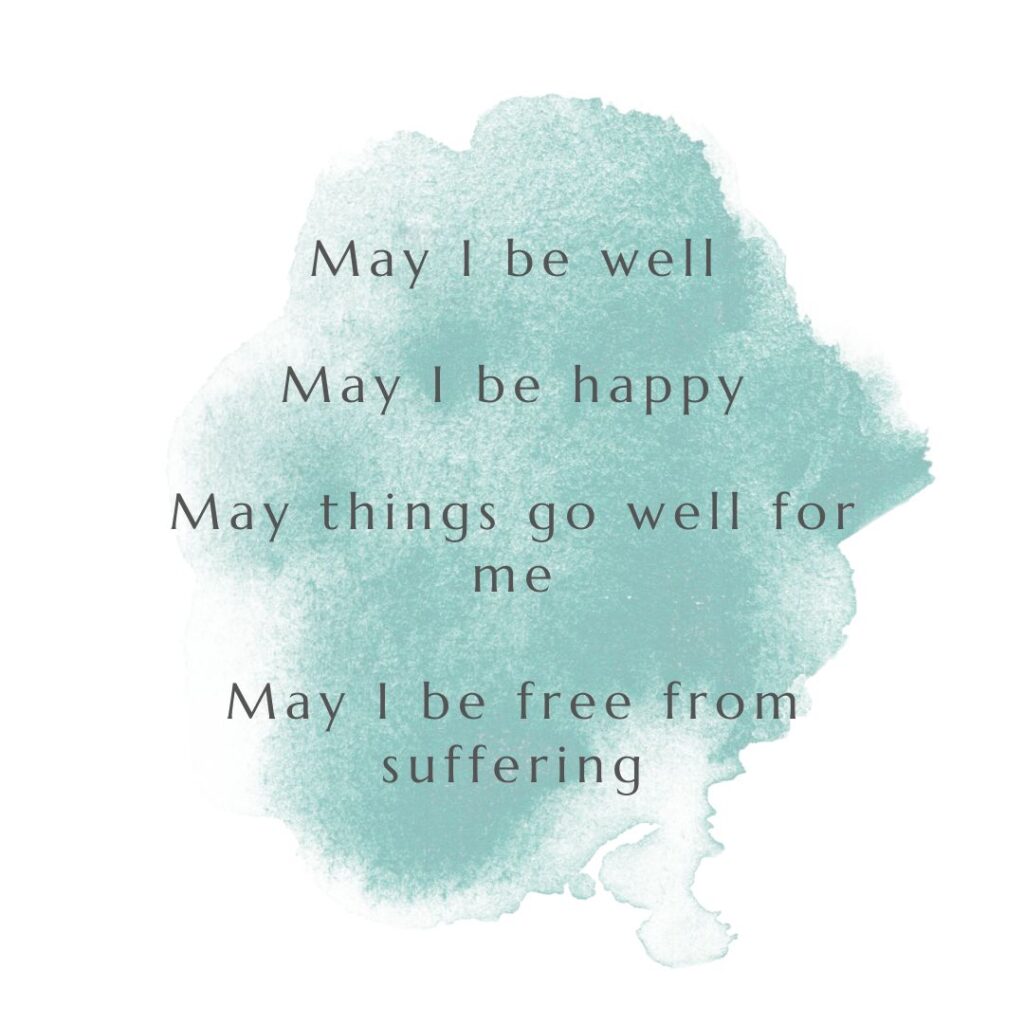
Happy New Year 2024…

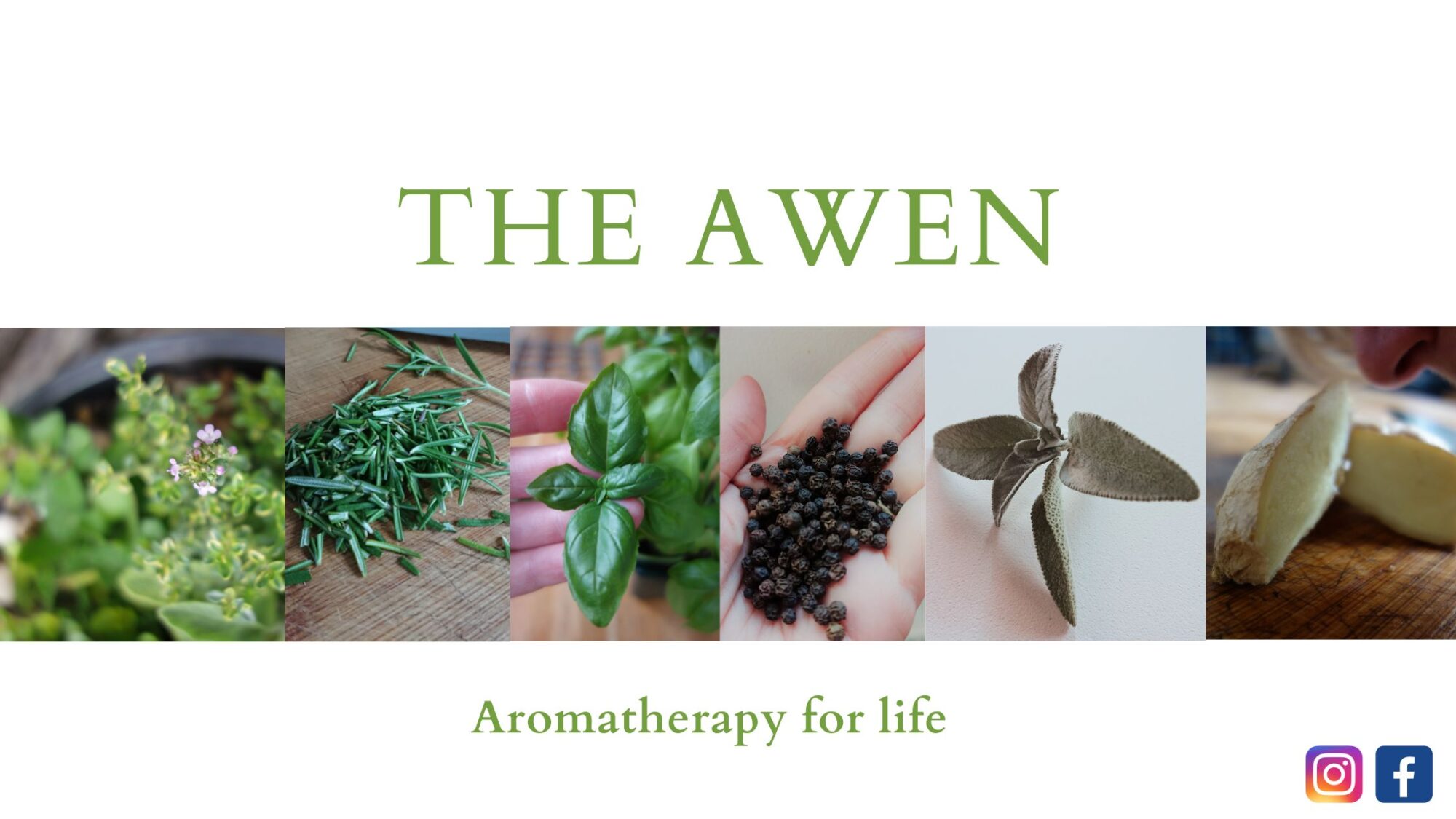
Blog about Aromatherapy oil, methods, practices and applications

It’s the time of year for warmer clothes, cosy nights and nourishment. This immune boosting tea is easy to make: fresh orange, grated ginger, tumeric, cinnamon and add a sweetener such as honey or syrup and add hot water.
Delicious.
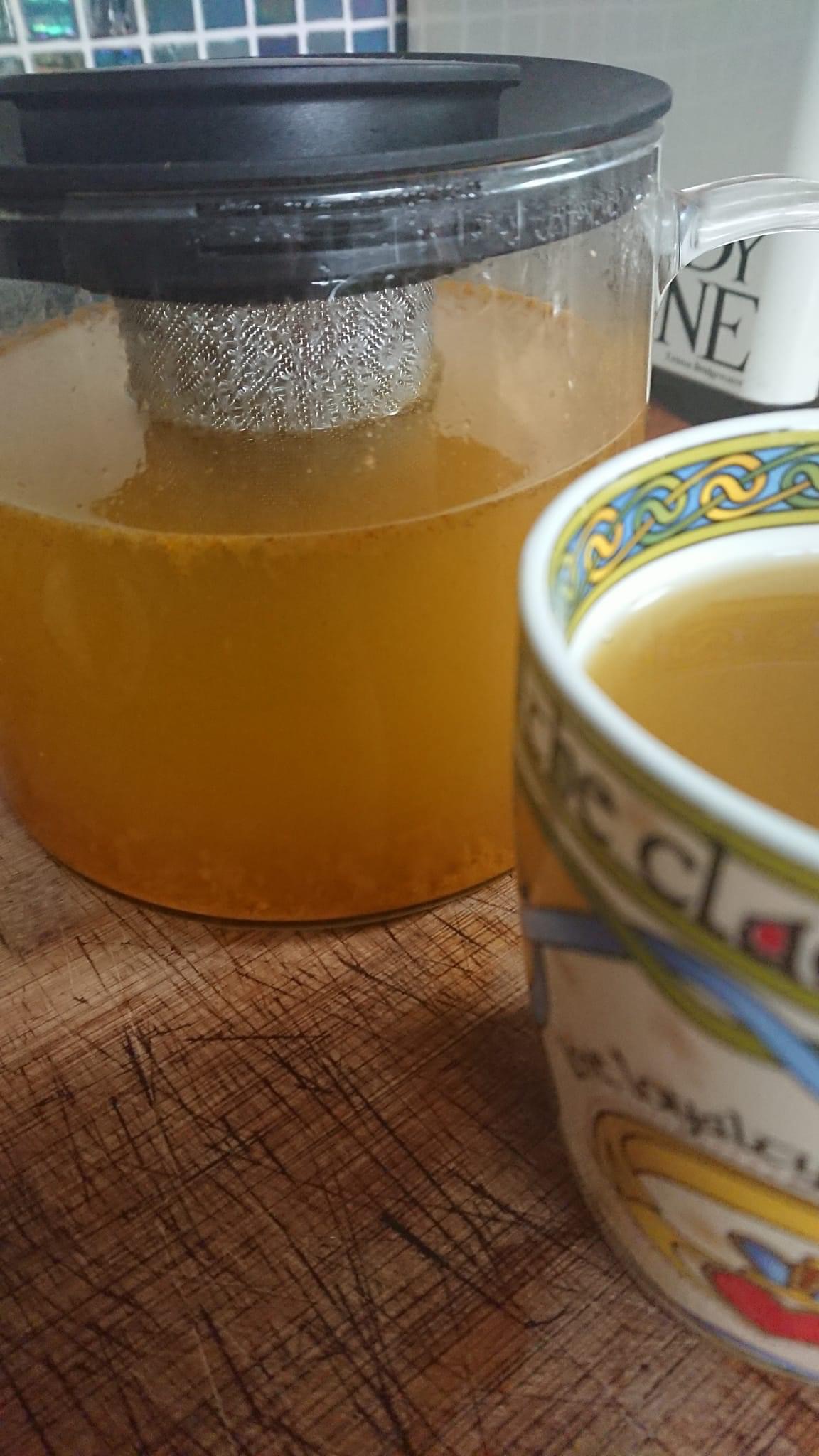
Enjoy this special time whatever you are doing 🌿
This evening I’m celebrating the summer Solstice with the citrus balancing tones of Bergamot; sharp, peppery detoxifying Juniper; and warm musky cleansing Cedarwood.
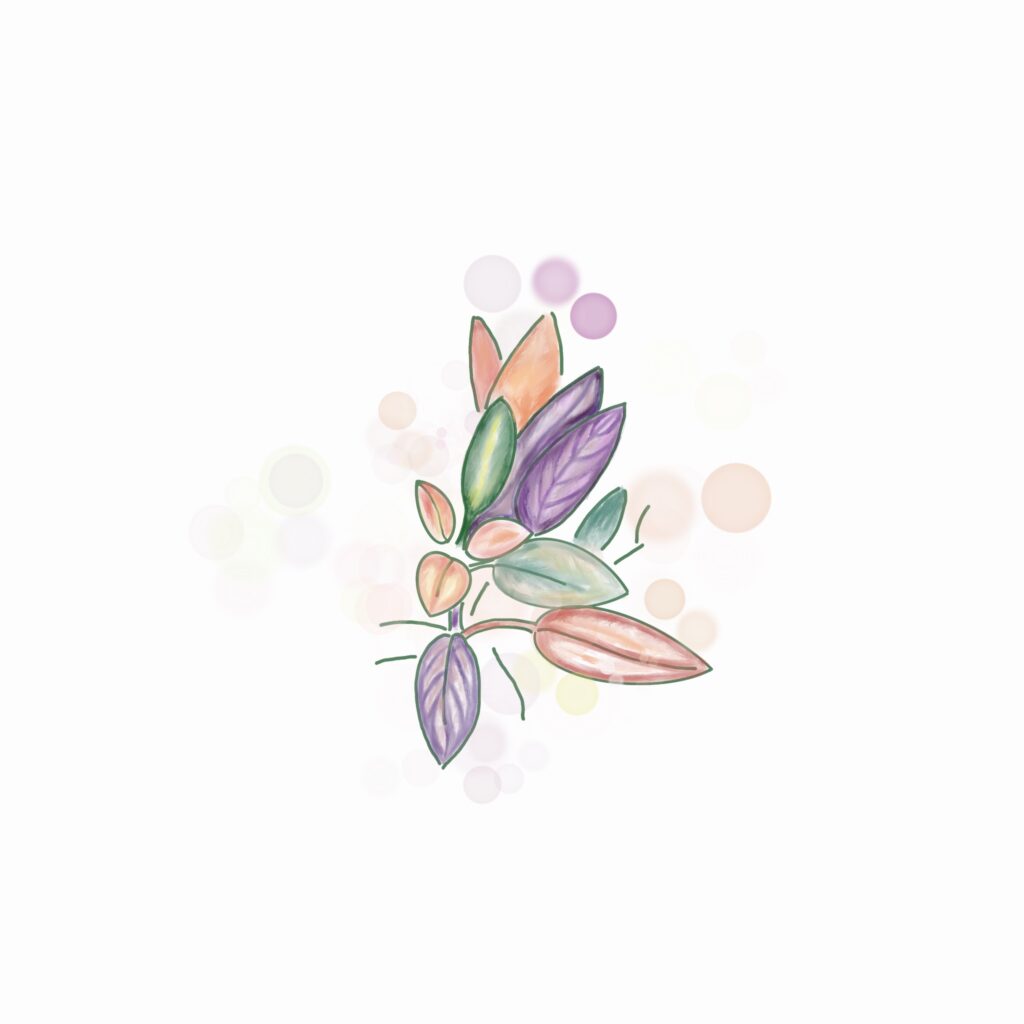
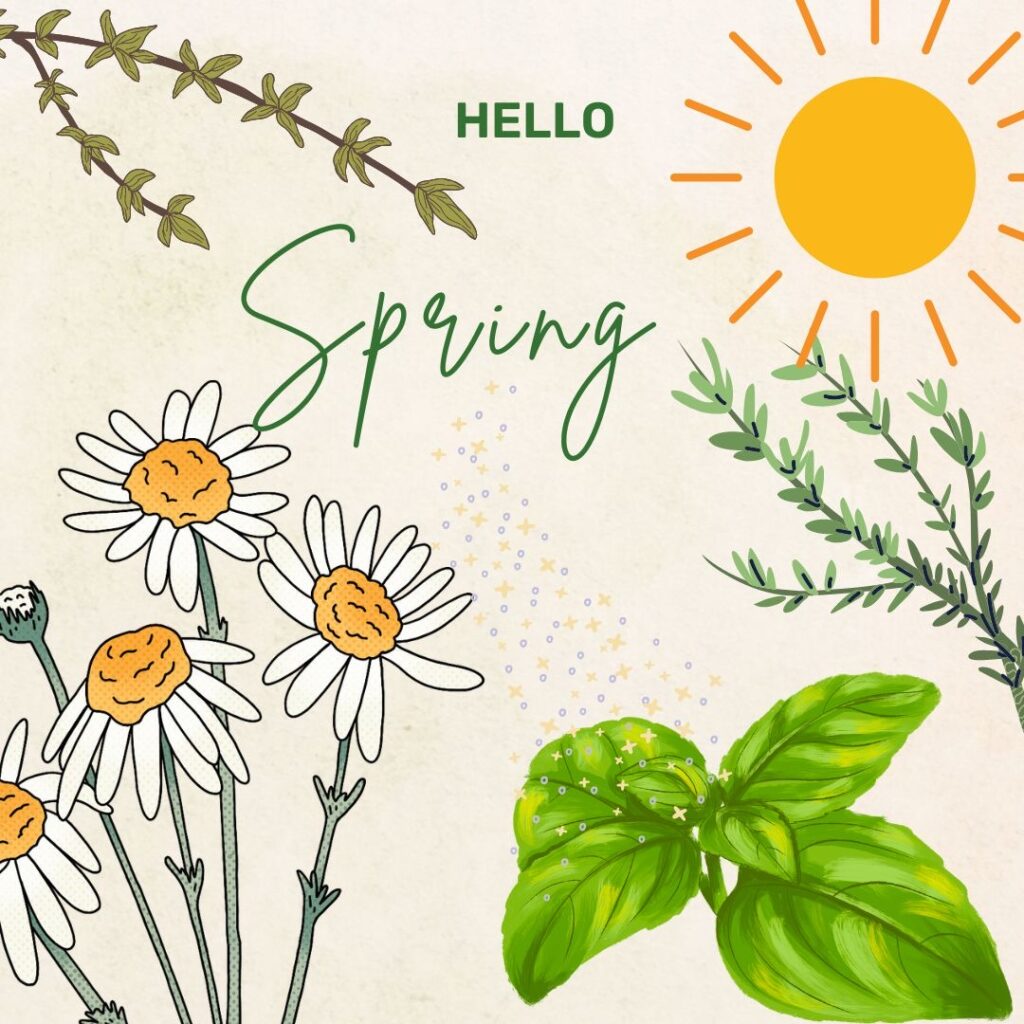
It might not feel like Spring yet so here are some oils to help you capture those seasonal aromas and give your mind and body a Spring clean in the process!
I have a vision of creating a beautiful herb garden, one which I potter around in, snipping sprigs of fresh herbs for alfresco dining, wearing an organic cotton apron, basking in herbaceous aromas in the sunshine. The reality was sewing a variety of herbs into plastic pots in between rain showers and hoping the early morning April frosts would not kill them! I potted cress too and the good news is this blooming already. Does anyone remember growing cress at school, bringing it home and sprinkling it on everything and anything? I can taste the peppery flavours now and it’s the perfect companion to egg mayonnaise.
As I was lovingly sewing my seeds and chalking the slate plant markers – a birthday gift from my husband – wishing it was sunnier and warmer, my mind turned to the oils of some of these incredible plants. In particular, Basil, Chamomile, Rosemary and Thyme. Apart from being used in food and tea, as essentials oils, these are some of my favourites because of their wonderful and magical therapeutic benefits. I wanted to create a lovely herbaceous blend inside and what better way than to add a drop of each to my burner and inhale their collective power.
Basil (Ocimum basilicum) grown in India and North Africa but now cultivated in Mediterranean countries like Italy and France has a clean, warm and aromatic aroma. Good for digestion and inflammation of the respiratory system, it is also an aid to concentration as it helps focus and wake up the mind. I like to use it when I’m working on something, writing or researching as its stimulating properties help lift our spirits too and if I have a foggy head including a headache, Basil is my go-to oil.
Chamomile Roman (Chamaemelum nobile) is grown in this country as well as places like France and the USA. It is refreshing, rich and earthy and I love its bright, happy flowers reminding me of sunshine and a warm breeze. I have fond memories of drinking Chamomile tea made by my mum to help calm my nerves when I was in a play aged about 10. Mum made me the tea from the flowers and stems, infused in hot water, and I remember drinking this before performing to help calm and soothe. It’s perfect for stress, depression and anxiety calming heated emotions and worry. Also good for PMS, heavy or irregular periods. You can add a 1 drop to 5ml of carrier oil and rub into your abdomen. Or soak a flannel in warm water, add 1-2 drops of the oil and then lay this onto your tummy, and place a warm hot water bottle on top to help ease symptoms.
Rosemary (Rosmarinus officinalis) is one most of us will cultivate quite easily. Careful where you plant it though as it can become huge. Like Basil, Rosemary is a stimulant therefore good for headaches, fatigue and nervous exhaustion. Brought to the UK by the Romans, it was used in battle for courage but it is also highly antiseptic so useful for treating wounds. In folk medicine, it is associated with having a good memory and there has been recent research investigating this claim, particularly aiding our future memory. Future memory can be defined as ‘remembering to remember’, for example, remembering things such as taking medicine, buying your niece’s birthday card, getting the chicken out the freezer before you dash off to work. Research has found that Rosemary does improve our future memory, attributed to the chemical 1,8-cineole (also found in other oils such as Eucalyptus). So as well as smelling wonderful, Rosemary can have a powerful impact in our brains.
Finally, Thyme (Thymus vulgaris) another Mediterranean plant, sweet and herbal, also stimulates our digestive and circulatory systems, increasing blood flow so careful if you have low blood pressure as it can, potentially, raise your blood pressure. It is also good for our head, helping with stress and nerves, stimulating our minds and helping clear out a cold and catarrh.
All of these oils can give our bodies and minds a Spring clean – clearing, stimulating and uplifting. Gorgeous on their own but also combined, they offer us a taste of Spring, lifting our spirits and hopes for warmer, sunnier days in the garden.
Contraindications: please check with your doctor if you are using immunosuppressants, hrt, or have high or low blood pressure. Do not use in pregnancy.
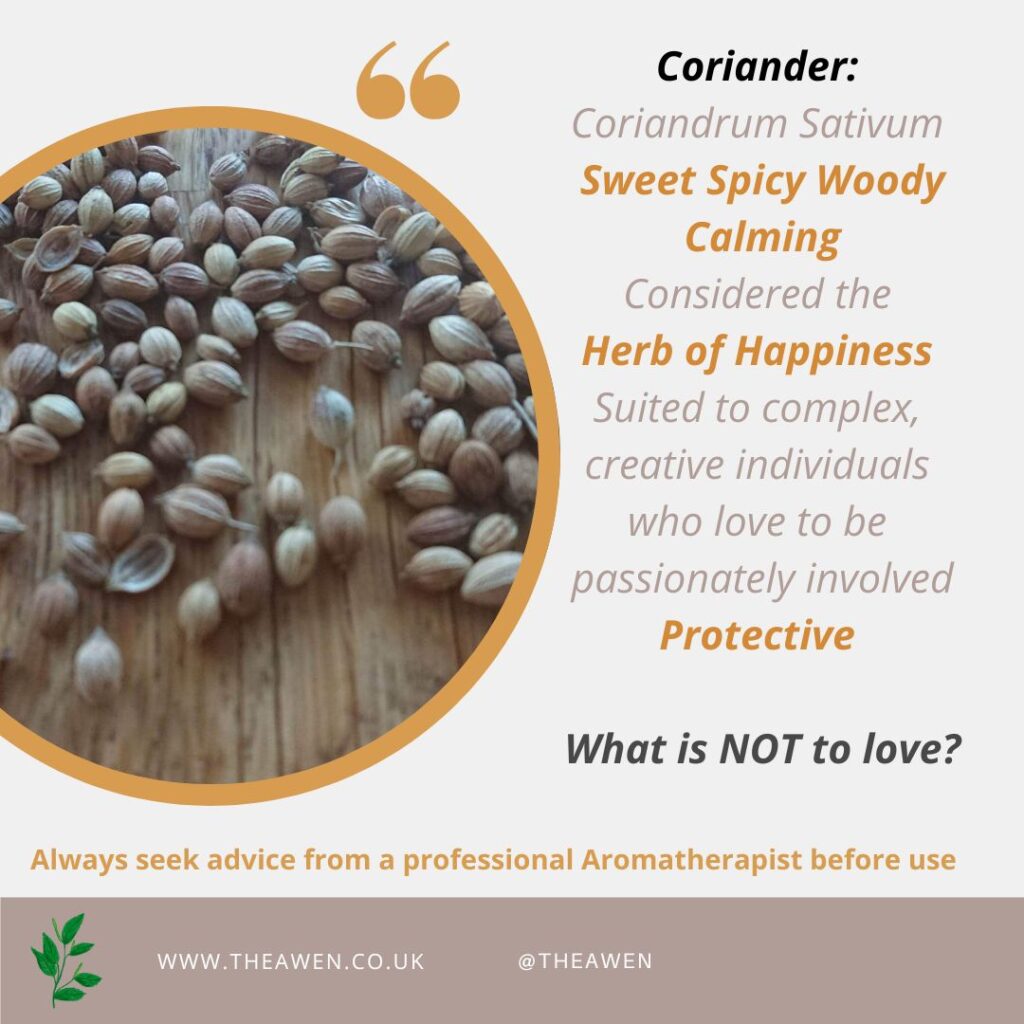
Now, first of all there are TWO essential oils from this plant – the leaf and the seed. I’m reviewing the SEED here but will do another post on the leaf soon.
Secondly, this essential oil is EVERYONE’S friend. Why do I say that? Well, it’s because it blends with everything. When I was looking at the how to blend this oil the list of ‘blends well with’ went on and on and I realised that you could use Coriander in most blends depending on the indicators and your client – or yourself, of course. Let’s not forget that you can blend for you – and what a joy this can be.
Coriander seed, whose Latin name is Coriandrum sativum, is from the Apiaceae family well known for aiding digestion. It’s a seed we are familiar with when cooking and eating Indian cuisine. You can buy the seeds to crush, or they come already ground. I love to just toss a few in whole as I love the crunch and surprise when eating a homemade curry. Spicy food can be an assault on our digestion so what better than to include an ingredient which will help with the smooth journey from mouth to execution! Indeed, this oil is good for flatulence – possibly a side effect from eating spicy food…!
Another oil from this family is Fennel, well-known to support our digestive system, therefore it makes sense in that the main therapeutic property for both these oils is carminative – mainly soothing inflammation within the digestive system, helping with issues such as indigestion, nausea, flatulence (as mentioned), spasms, bad breath, colic as well as being good for anorexia and stimulating appetites. So the suggestion here is add the seeds (bought from the supermarket/shop) to our food but use the oil to combat some of the symptoms listed. For example, combine a couple of drops of Coriander essential oil to 5ml of carrier oil (Sunflower) and rub this into your abdomen to soothe and calm. You could also add Fennel here, or floral oils such as Geranium, Rose, Jasmin creating a beautiful aroma (see the bottom of this post for advice on dilution).
Moving onto our nervous system, Coriander seed is known to help with metal fatigue, promoting confidence, bringing clarity to foggy thinking. With this in mind it would blend well with oils such as Lemon, Basil and Marjoram. If you need focus and concentration, or are putting off starting a task involving brain power, this combination could work very well. Yet Coriander can also aid sleep, soothing fear and sadness. Again, it works on your mind as much as your body. What a beautiful oil, a great friend to have when you need to cut through the chaos!
Other ways it can help are with circulation and immunity. It’s a purifier. Again, very similar to Fennel here in that it’s a diuretic, boosting our circulation and getting rid of fluids or toxins. Good for menstrual cramps and bloating which are often associated with PMS. It is good for lethargy and feelings of burn out too so put in your burner or pop a few drops in the bath if you are feeling mentally and physically exhausted and need to recover.
As indicated at the top of this post, it’s suited to complex and creative individuals, who find routine and predictability difficult, throwing ourselves (yes me…) headlong into projects without thinking first….Ah. A lovely blend here could be a grounding oil offering stability and protection: Juniper berry and Cedarwood would be perfect companions in this case.
But, like I said, it’s a perfect blend with so many oils so you can choose freely. In fact, it’s been described as a blend enhancer, pulling other oils together to create that perfect synergy. The herb of happiness indeed.
Safety advice:
Coriander is non toxic, non irritant and non sensitising so it is generally safe to use however if you do experience any reaction such as sore/red skin, or breathlessness, stop using immediately.
Dilution should be 2 drops of essential oil per 5ml of a carrier (oil, lotion, gel, etc) for the body. 1 drop of essential oil per 5ml of carrier for the face.
Do no ingest essential oils.
If you have any concerns or issues consult your doctor first. Always use a qualified Aromatherapist for treatments.
A friend asked me how to burn oils and I thought I would share how I do it at home. There two main ways to get oils into our bloodstream – inhalation and through the skin. Here I will show you how to use oils in an oil burner.
An oil burner has a small ‘well’ where you put water and then oils which is then heated up by a candle. It’s a lovely way to inhale oils as you can create any blend, or just use one oil, to support how you are feeling or alleviate symptoms such as a cold. For example, I often use a Eucalyptus oil when I’m feeling congested and want to breathe easier. Or if I need to concentrate in the morning I’ll prepare a blend of Basil, Lemon and Rosemary. Alternatively, if I need a blend to soothe and calm after a long tiring day – Bergamot, Lavender and Ylang ylang is a favourite. I generally don’t use more than three oils in a blend though because when I blend to a symptom or symptoms, the synergy of the oils works better this way.
Firstly, you need a burner! Oil burners can be purchased online or in gift shops, or anywhere really! I found this one in a charity shop and it serves me well.
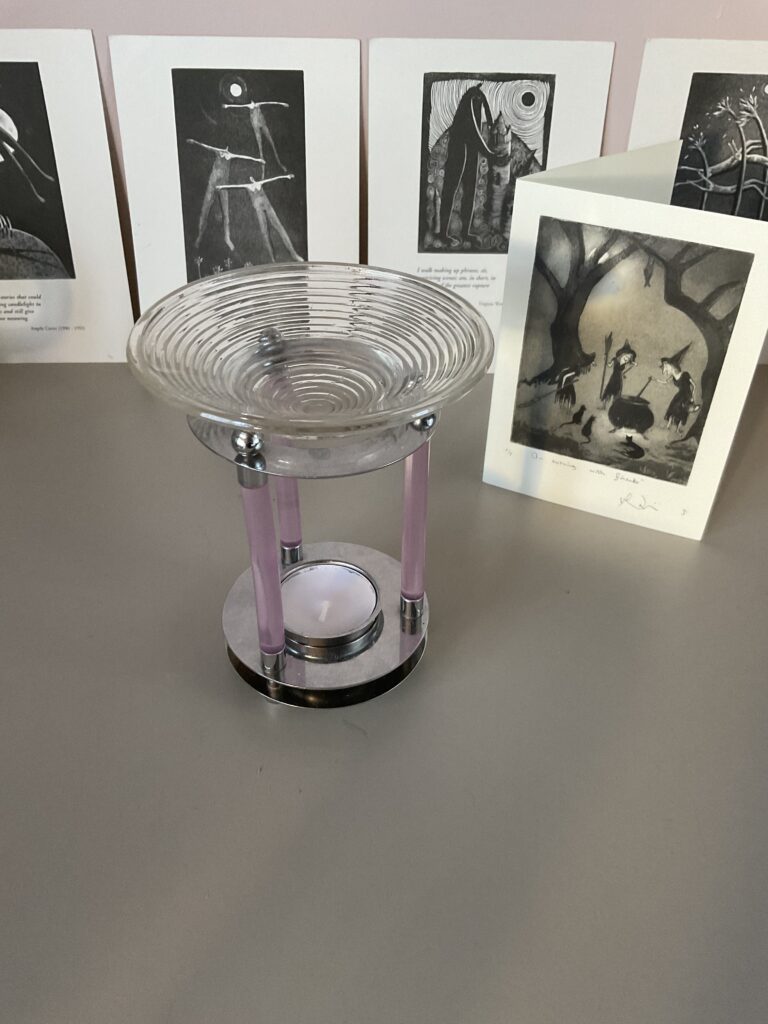
Next, I pour in about a tablespoon of tepid water. Warm water helps the oils diffuse quicker.
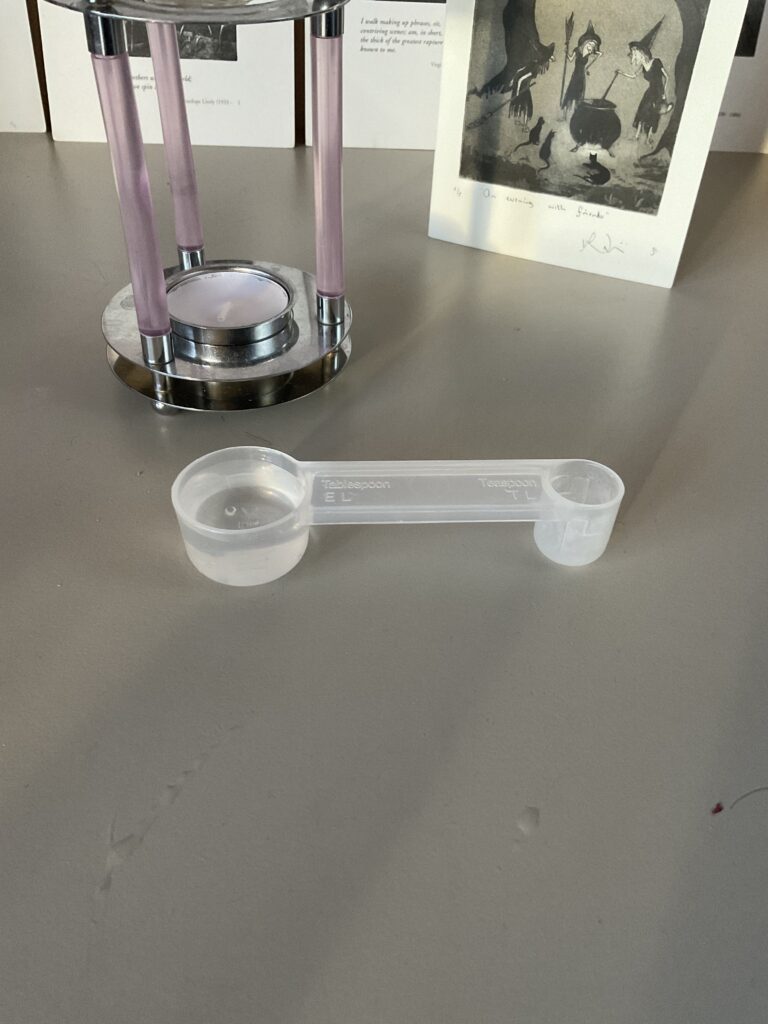
Then, I carefully add one drop of each oil. Today, I’m using Geranium and Fennel. Geranium is balancing and good for women who are experiencing the menopause. Fennel is cleansing. I just felt like I needed these two oils today!
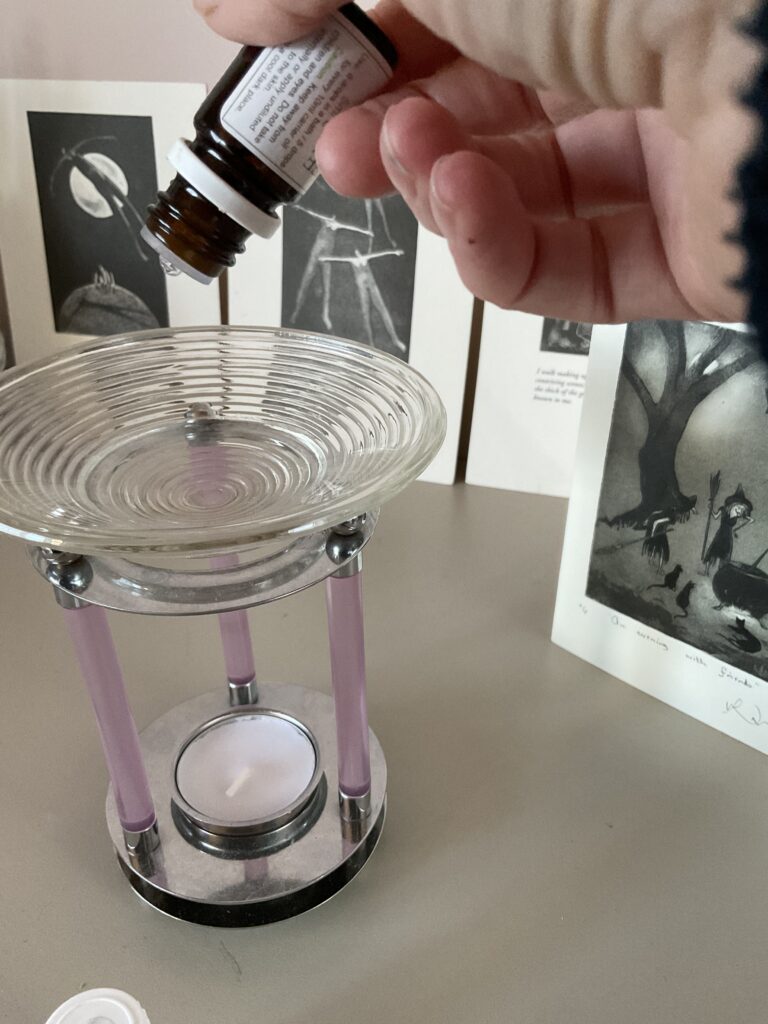
Once you’ve added a drop of each oil, you are ready to light your candle and let the oils do their work.
Enjoy.
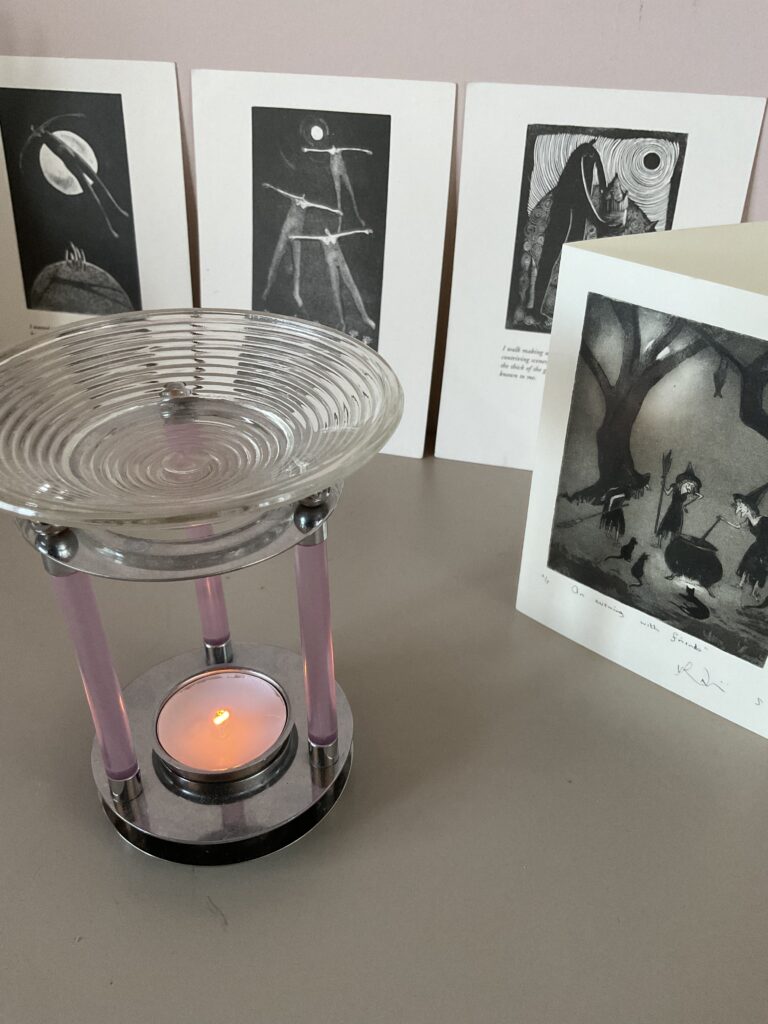
What I love about essential oils is how they make you feel. You can lean on them like an old familiar friend to help you through tough times whether that is sleeplessness, over tiredness, anxiety, agitation, lack of concentration, or grief.
In 2021 my mum died suddenly at home. I had just arrived at work, a new job, week 3, teaching and that morning I was feeling pretty good. Only a few weeks ago I had been stressing over the prospect of this job, thinking I couldn’t do it, shedding tears with my mum as I worried about my self care going down the pan as I knew it would be a sink or swim start. But that morning, as I drove to work, I felt I’d turned a corner; I could do this, life was good. Then I got a phone call. I left work, wondering if I would ever return (I did) and drove home to devastating news. But the worst thing was only half an hour earlier whilst I’d been thinking all of those positive things in the car that morning, my mum had died. In fact, she had already died and I didn’t know.
These thoughts haunt me still and as we approached her one year anniversary late last year, I thought about this a lot. My mind was whirring over the last time I had seen her, what she was doing in the days leading up to her death, looking at her last texts, her last social media posts, our last conversation and thinking ‘this time last year, mum was alive’. And then, ‘this time last year my mum had died and I didn’t know’.
Grief is a lonely experience because it is unique and everyone has their own way of coping. All relationships are unique so the grief you feel is based on that relationship. I felt as if someone had pulled the rug from beneath my feet and I felt I was falling and floundering. What I wasn’t prepared for was the overwhelming sadness. I missed my mum so much. It was immediate and I wondered how I was going to manage. I’m very fortunate; I have a loving caring brother with whom I can share my grief with, a loving caring husband who looks after me, and loving caring children. But I was still sad and felt very alone.
I lost a parent – ‘it’s normal’ I rationalised. I had lost my dad to slow and painful cancer when I was in my 20s which was hard. My mum died suddenly, happy in her own home, surrounded by everything she loved. Although it was awful for us, it was good for her. She was frighted of dying. She didn’t know she had died. She felt no pain. I take a huge comfort from this.
Grief is a complex and contradictory process and as an Aromatherapist I have turned to my oils to support me. Oils are inhaled or absorbed through the skin. Some oils such as Lavender and Tea tree can be applied directly onto the skin but most oils we blend with a carrier oil or salts or put into a diffuser or burner. It’s safer this way as essential oils are volatile, unstable and should be used with care. Those tiny molecules extracted from plants are powerful; they can be stimulating, balancing or relaxing and we don’t know exactly how they interact with our bodies as it can depend on many things. There is on-going research into the main indicators of oils and how we can use them to our benefit.
As Aromatherapists we blend oils through consultation by listening carefully to what people tell us, we treat the person, holistically. Grief, for example, is not one thing. It is feeling overwhelmed, it’s not sleeping very well, it’s worry, it’s anxiety, it’s sadness, anger, brain fog, confusion, it’s getting things out of perspective, it’s arguing with the people you love, it’s not doing your job very well, it’s coping and not coping, it’s reassessing, it’s depression, it’s over eating or not eating the right food or not enough food, it’s drinking too much, it’s isolating, it’s all of these things and more. So we can use oils to manage these symptoms and blend according to plant families, indicators, body systems, aroma, chemistry. It’s a formula we call synergy but an experienced Aromatherapist will also use intuition. Sometimes you just know which oils to blend and often when you look at the rationale behind the choice it’s seems incredible how you got there because it was ‘right’. So what oils did I choose for myself today?
Today I focused on one oil in particular: balancing Sweet Marjoram, Origanum majorana. Distilled from the flowering herb, it is part of the Lamiaceae plant family known for balancing the endocrine system as well as being anti bacterial, respiratory and anti viral. But I find myself reaching for it to help relieve symptoms of stress, tension, anxiety and insomnia.
Like many oils, it has a rich history in folk lore and has long been associated with encouraging sleep and contentment. Known as the ‘joy of the mountains’ it was given to married couples and planted in graveyards to bring peace to the departed as well as help the living connect with a departed loved one. It is warming, relaxing, gentle and protective, considered to spread joy and good fortune.
Studies have shown that Sweet Marjoram actively calms our nervous system by lowering sympathetic nervous system activity (feelings of fight or flight) and stimulating the parasympathetic nervous system – a network of nerves that relaxes our body after periods of stress and danger. When we are in this parasympathetic state, our blood pressure is lowered and so the overall effect is calming as well as strengthening. In addition, Marjoram can help soothe an over-active mind, reducing obsessive thinking often associated with deep emotional trauma such as grief, loneliness, ptsd, and shock. It is sedative so excellent to use before bedtime relieving insomnia and calming that hyperactive mind.
Today I’m blending it with the fresh citrus and strengthening aroma of Bergamot and the calming, heady but hugely positive Ylang Ylang. Together these oils bring me joy as well as peace.
If you are grieving, there is support out there through the NHS, Cruse and Mind as well as local support groups and counselling. Click here for more information and support.
Contraindications: avoid in pregnancy and be careful if you have low blood pressure as these oils can lower your blood pressure and can be sedatory.
References: Jennifer Peace Rhind, Aromatherapeutic Blending, 2016. Rosemary Caddy, Essential Oils in Colour, 1997.
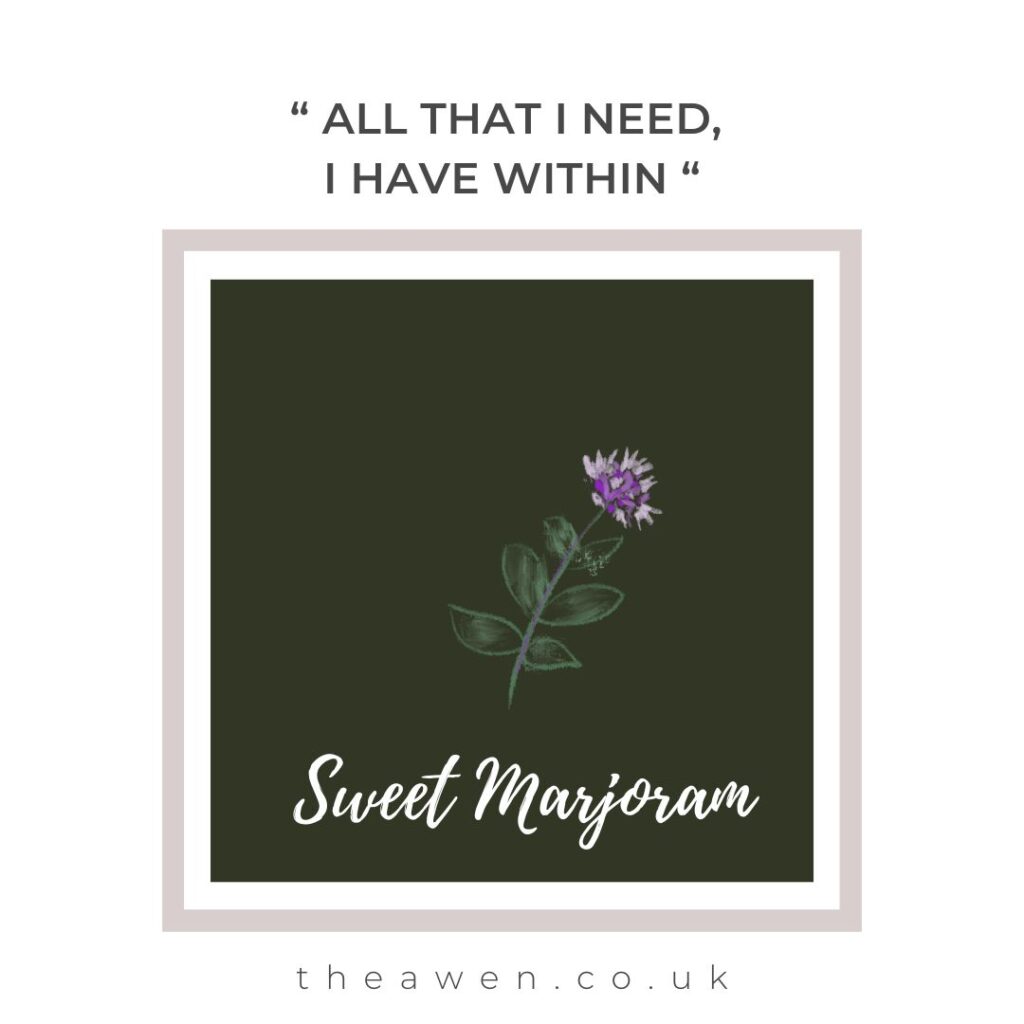
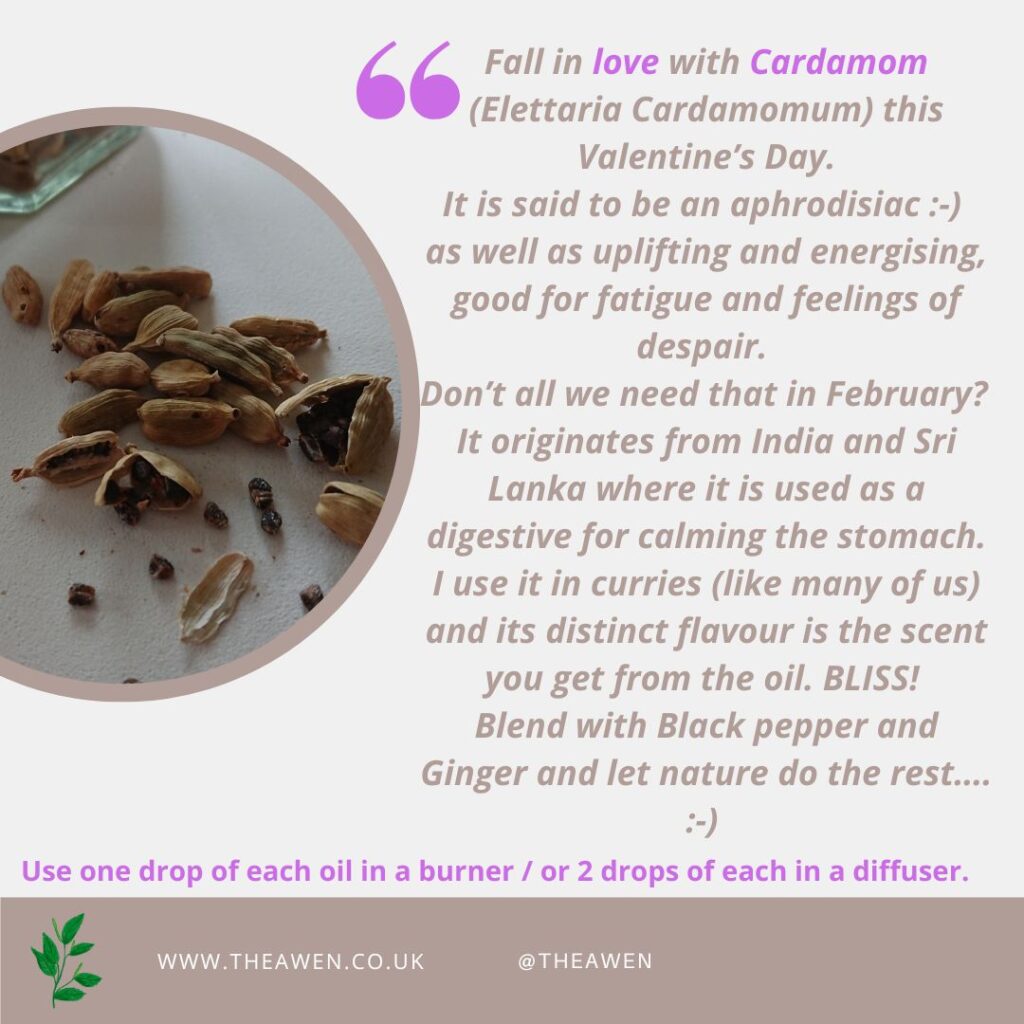
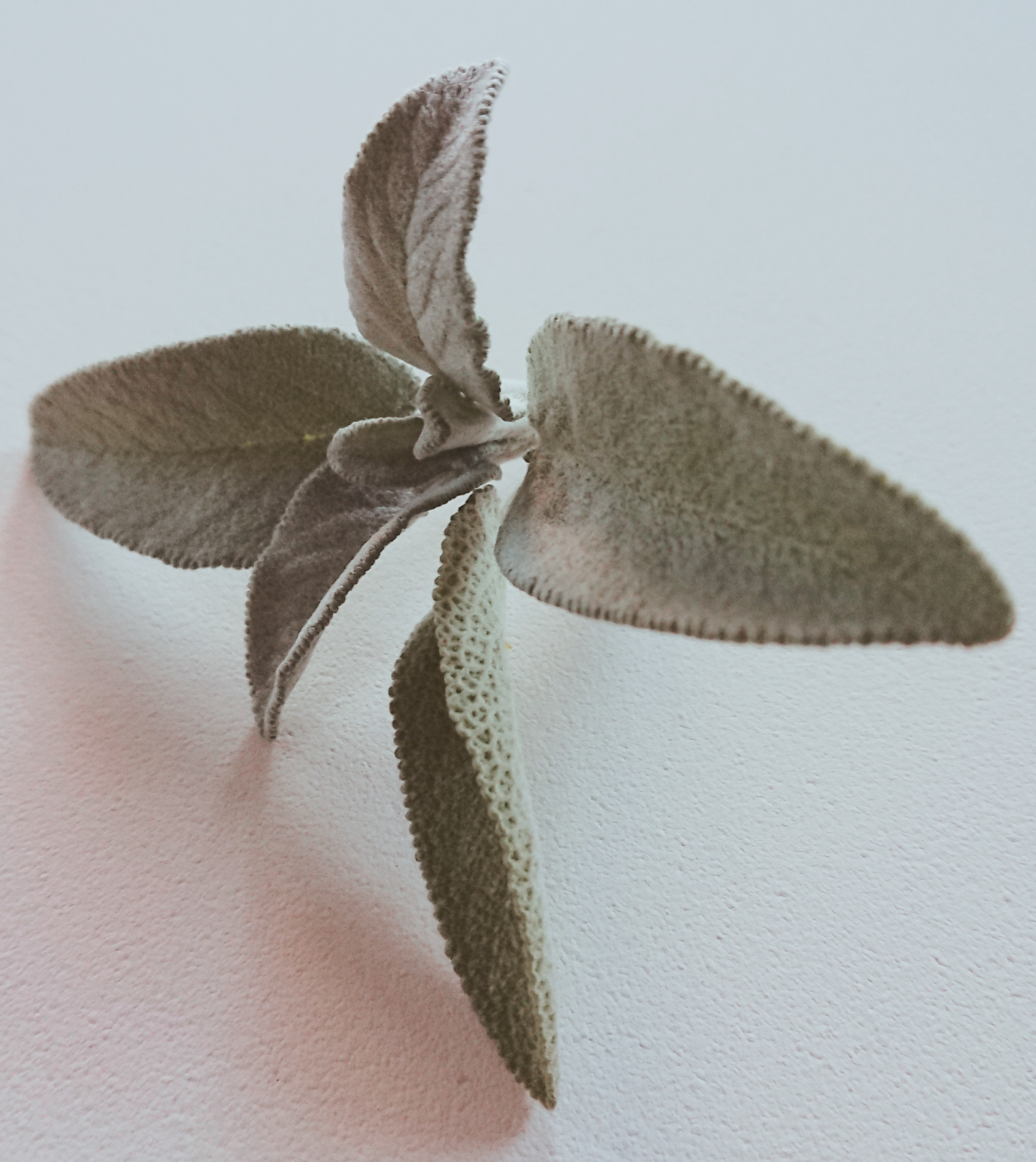
Distilled from the flowering herb, Sage has long been seen as a miracle plant. The word ‘Salvare’ means to heal, to save and was used frequently by the Romans and throughout the middle age as a nerve tonic relieving nervousness, tension, stress as well as aiding concentration. It is rich in keytones therefore should be used with caution as it can accumulate or build up within the body and so should be used in very small amounts.
Having said that, it has excellent therapeutic benefits. For example, it is clarifying which can positively impact unbalanced or infrequent menstruation periods as it stimulates hormones and can clear a ‘menstrual obstruction’. It relieves other PMS symptoms such as headaches, tiredness, mood swings and depression. Other therapeutic benefits include anti inflammatory, antiseptic, expectorant (clearing out sinuses, fevers, flu) and anti spasmodic relieving coughing and cramps. It soothes and calms digestion helping neutralise acids in the stomach and bloodstream, relieving hiccups and colic.
A top note oil, Sage has a spicy, warm and minty aroma. I like to use it in my skin care routine diluted in a moisturiser (1% blend) as its antioxidant properties are known to aid the regeneration of skin cells. As we age, our skin becomes wrinkled and can loose it’s shape. Sage can support us here – maybe not provide a miracle – but its therapeutic actions can support this inevitable and perfectly natural process – beautifully.
Seek advice from a qualified Aromatherapist when using essential oils. It is not recommended for children, or used during pregnancy as it can activate menstruation. Avoid using if you suffer from epilepsy.
